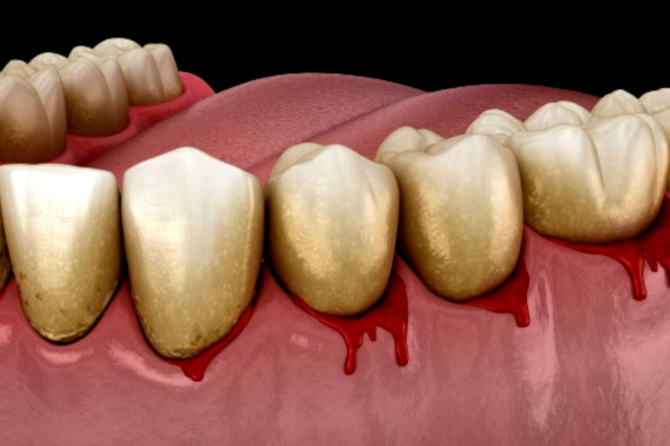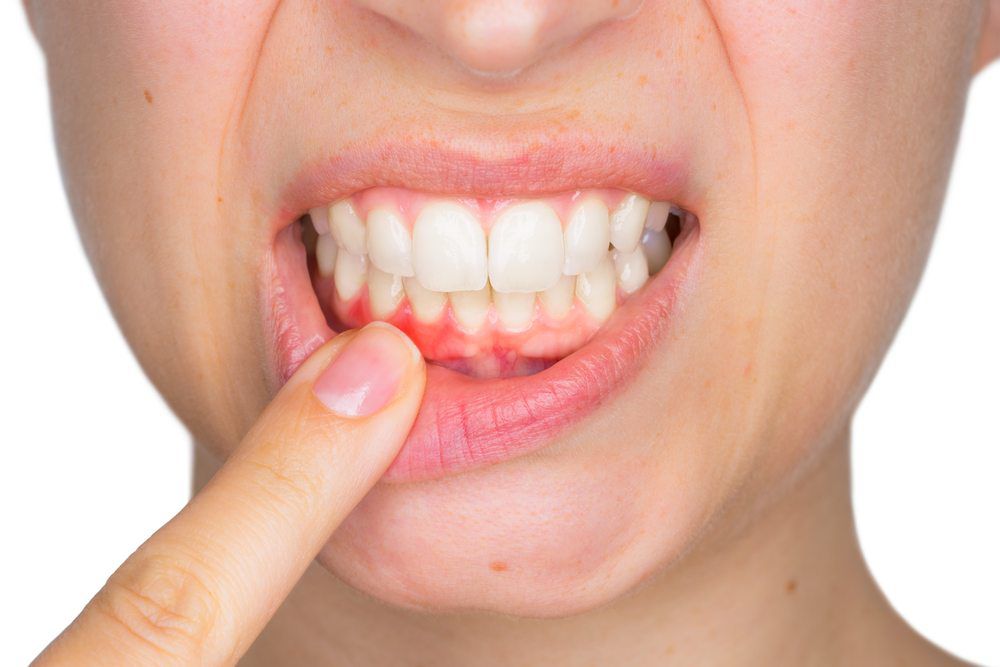
Say Goodbye to Sore Gums: Home Remedies, Diet & Lifestyle Changes
Sore gums are a common irritation that can affect anyone. It can cause pain, swelling and difficulty eating. In severe cases, sore gums can lead to tooth loss and gum disease. While it is best to visit a dentist for treatment, there are also home remedies that can help provide relief. This guide will explore the causes of sore gums and provide advice on how to treat them using a combination of natural home remedies and professional solutions. It will also include tips on preventing and managing sore gums and expert advice on how to care for your gums. By following these steps, readers will be able to reduce their discomfort and improve their overall oral health.
Who Gets Sore Gums?
Sore gums affect all ages, genders, and walks of life. Everyone is susceptible to the condition, but some groups are more likely to experience it. These include pregnant women, smokers, people with weakened immune systems, and those who neglect dental hygiene.
Sore gums can be caused by a variety of factors. Poor dental hygiene can contribute to the buildup of oral bacteria, leading to infection. Brushing too hard or using the wrong toothbrush can lead to irritation, which can make your gums vulnerable to infection. Medical conditions such as diabetes and HIV might also weaken your immune system, making it difficult to fight off gum infections.
Certain medications can also cause sore gums. Some antibiotics can irritate the gums, while others may interfere with the body’s ability to absorb the necessary vitamins and minerals needed for healthy gums. Pregnant women can also be prone to sore gums due to hormonal changes during pregnancy.
Smoking is another common cause of sore gums. It reduces the amount of oxygen in your blood, which makes it harder for your body to fight off infections. Smoking also increases your risk of gum disease because of the toxic chemicals in cigarettes. Finally, if you consume excessive amounts of alcohol, this can also increase your risk of experiencing sore gums.
Sore gums can be a very uncomfortable experience and the cause needs to be identified in order to treat it. There are many different signs and symptoms that indicate a person has sore gums. Knowing what they are and noticing them early can help prevent more serious issues. The most common symptom of sore gums is pain that ranges from mild to severe. This can be felt even when the gums aren’t touched or brushed. In some cases, the pain can be sharp and sudden. Other symptoms include swollen and tender gums, irritation and redness, bleeding while brushing your teeth, bad breath, and receding gums. In more serious cases, there may be pus around the gums and pain while chewing. It’s important to note that the above symptoms can be caused by other issues such as gum disease and infection. Therefore, it’s best to visit a doctor or dentist if the symptoms persist for more than a few days and don’t seem to go away. The doctor or dentist can accurately diagnose and treat the cause of sore gums.

Popular Home Remedies
When the gums are sore, there are plenty of home remedies that offer relief without a trip to the doctor. Here are some of the most popular ones:
- Ice Packs: Ice can help numb the affected area and reduce swelling. Place an ice pack over the gum for five to 10 minutes at a time.
- Saltwater Rinses: Dissolve one teaspoon of salt in one cup of warm water, and then use the solution to rinse your mouth for 30 seconds. Make sure to spit out the solution after each rinse.
- Clove Oil: Clove oil is known for its antiseptic and anti-inflammatory qualities. Dilute it with a carrier oil, such as coconut or jojoba oil, and apply it directly to the gums. Leave it on for a few minutes before rinsing it off.
- Turmeric: Turmeric is a popular natural remedy for sore gums. Mix a teaspoon of turmeric powder with a tablespoon of water to create a paste and apply it to the affected area. Leave it on for 15 minutes before rinsing it off.
Though these home remedies may provide temporary relief, more serious issues should be addressed by a professional. Do not hesitate to talk to your dentist or doctor if you have any doubts.
Professional Solutions for Sore Gums
If the home remedies don’t seem to help reduce the pain or discomfort of sore gums, it’s important to seek advice from a professional. Your dentist or doctor can provide medications and procedures to help treat your sore gums.
Your dentist may recommend using an antimicrobial rinse or a topical antibiotic to help reduce bacterial growth in the mouth. This can help ease the symptoms of sore gums, as well as prevent infection from spreading. Additionally, they may suggest that you have a scaling and root planing procedure in order to remove any plaque and tartar buildup that might be causing your gum pain.
Your doctor may also recommend taking over-the-counter anti-inflammatory medications such as ibuprofen or aspirin to help reduce inflammation and pain. In more serious cases, they may prescribe antibiotics to kill off the infection-causing bacteria. If the infection is very severe, they may also suggest surgery to remove any dead tissue, or to repair any damage to your gums.
It’s important to remember that, while professional treatments may help to reduce your gum pain, they are not permanent solutions. It’s still essential to practice good oral hygiene in order to prevent any further gum problems.
Diet Considerations for Sore Gums
What we put into our body can have a direct influence on the health of our gums. Eating and drinking the wrong foods and beverages can exacerbate sore gums and even lead to further gum problems. On the other hand, certain dietary and lifestyle changes may result in a reduction of symptoms.
Foods to Avoid
Foods and drinks that promote tooth decay—such as sugar laden and acidic snacks—should be avoided or consumed in limited amounts, as they can weaken the enamel of the teeth, potentially causing gum irritations. Additionally, if you are suffering from dry mouth due to medications, dry or sugary snacks should also be avoided as saliva is necessary to keep the gums healthy. Other foods such as spinach, nuts, and certain fruits can cause painful irritations in the gums.

Foods to Eat
Eating healthy cruciferous vegetables such as cabbage, cauliflower, and broccoli on a daily basis can help reduce the risk of developing oral health problems. Additionally, foods rich in omega-3 fatty acids—such as fish, avocado, and olive oil—will provide the essential nutrients necessary for maintaining strong and healthy gums. Incorporating fiber-rich foods will also help keep the gums healthy and prevent gum irritations.
Drinks to Avoid
Coffee and soda should be avoided, as they can cause teeth discoloration and sensitivity in the gums. Similarly, energy drinks are quite acidic and can erode the tooth enamel, leading to gum irritation. Cow’s milk has been found to increase the risk of periodontal disease in some people and so should be consumed with caution.
Drinks to Have
To maintain healthy gums, it’s important to stay hydrated. Water is naturally the best option, but tea and sugar-free juices can also be beneficial. A daily green smoothie containing plenty of leafy greens and herbs can also support healthy gums and teeth.
Lifestyle Changes
In addition to dietary and home remedies, certain lifestyle changes can be beneficial for treating sore gums. Smoking and drinking alcohol are two of the main activities that increase the risk of developing the condition or worsening existing problems.
The chemicals in cigarettes and alcoholic drinks can aggravate the gums and make them more susceptible to infection. Quitting or reducing these habits can help improve gum health and prevent further irritation.
Aside from these, it plays an important role to maintain good dental hygiene. Brushing teeth twice a day, flossing and using mouthwash helps keep your gums clean and healthy.
Physical exercise can also have a positive effect on gum health as it strengthens the immune system and reduces inflammation. Getting enough sleep is also essential for fighting off infections.
Finally, it is important to manage stress as it can cause physical and mental health problems that can weaken the body’s resistance to disease.
Prevention for Sore Gums
When it comes to sore gums, prevention is always better than cure. It is important to take steps to ensure that your gums remain healthy and don’t develop any problems. This is especially true if you have a condition such as gingivitis or periodontal disease, which can cause sore gums.
Practice Good Oral Care
It is essential to practice good oral hygiene in order to prevent sore gums. Make sure to brush your teeth at least twice a day, floss regularly and use an antibacterial mouthwash. Also, visit your dentist for regular check-ups and cleanings.
Avoid Certain Foods
Certain foods can irritate the gums and make them more susceptible to soreness. Foods that are high in sugar, acidic or hard should be avoided. Sugary and acidic drinks, such as soda and fruit juice, should also be avoided. Furthermore, it is important to consume foods that are rich in vitamins and minerals, such as fruits, vegetables, and fish.
Stay Away from Harmful Habits
Habits such as smoking, drinking alcohol, and chewing tobacco can cause severe damage to the gums and lead to the inflammation of the soft tissues in the mouth, making them more prone to soreness. Therefore, it is best to avoid these habits in order to maintain gum health.
Pay Attention to Symptoms
If you experience any signs of sore gums, such as redness, swelling, and tenderness, then you should seek medical advice immediately. It is important to address the issue at the onset, as this will reduce the risk of further damage.
Expert Advice for Sore Gums
Managing sore gums can be tricky. Fortunately, experts provide a few guidelines to help reduce the discomfort and manage the condition. Here are a few helpful tips on how to manage sore gums.
- Brush Your Teeth Properly: Brushing your teeth too hard or using a hard-bristled brush can aggravate sore gums. Using a soft-bristled brush and light pressure is recommended. Brush in a circular motion, avoiding harsh scrubbing.
- Floss Regularly: Flossing is important for removing plaque and preventing gum problems. However, it’s important to use gentle techniques to avoid irritating the sore gums. Consider using unwaxed dental floss or a water flosser.
- Watch Your Diet: Consuming sugary and acidic foods or beverages can cause damage to your teeth and gums, making them more susceptible to infection. Eating a balanced diet with plenty of fresh fruits and vegetables can help keep your gums healthy and infection at bay.
- Avoid Tobacco Use: Smoking or chewing tobacco can cause inflammation, discoloration, and irritation in your gums. Quitting smoking or cutting back can help reduce your risk of developing conditions such as gum disease.
- Rinse After Eating: Rinsing your mouth with water after meals or snacks can help remove food particles that your toothbrush failed to remove. Taking the time to rinse away food debris can help reduce the risk of gum infections.
- Consult a Dentist Regularly: Visiting your dentist regularly for check-ups and professional cleanings can help prevent serious gum problems from developing. Be sure to let your dentist know if you are experiencing any pain or discomfort in your gums.
By following these expert tips, you can take control of your sore gums and help reduce their symptoms.
FAQs – Common Questions about Sore Gums
Sore gums can be uncomfortable and cause distress for many people. Therefore, knowing what causes sore gums, how to prevent them and how to treat them is essential. The following are some of the most commonly asked questions about sore gums.
- What causes sore gums? Sore gums can be caused by a variety of factors, including poor oral hygiene, gingivitis, periodontal disease, food allergies, bacterial infections, trauma to the mouth, and certain medications.
- Are there home remedies for sore gums? Yes, there are many ways to treat sore gums with home remedies. These include drinking peppermint tea, using saltwater rinses, applying cold compresses, using clove oil, and gargling turmeric.
- How can I prevent sore gums? There are a few steps you can take to reduce your chances of developing sore gums: maintain an excellent oral hygiene routine, practice proper dental care, avoid smoking and excessively sugary drinks, and eat a balanced diet with foods rich in calcium and Vitamin C.
- What should I do if the soreness persists? If your sore gums don’t improve after following the home remedies mentioned, it’s advisable to seek professional help from a dentist or doctor for medical treatment.
It’s important to take good care of your mouth and gums in order to keep them healthy. If you experience any signs of soreness or discomfort in your gums, it’s important to take action as soon as possible.
Sore gums can be a distressing experience, but thankfully, there are many home remedies and professional solutions that can help. This article outlined the causes, symptoms, popular home remedies, professional solutions, diet considerations, lifestyle changes, prevention and expert advice to help treat the condition. In conclusion, sore gums can be managed with home remedies, professional treatments, dietary adjustments, lifestyle changes and preventive measures. It’s important to take advice from health professionals and to stay consistent with any treatments prescribed. If any symptoms worsen or persist, it’s best to speak to a doctor. If you’ve been experiencing sore gums, now is the time to take action. Make an appointment with your dentist or doctor and begin treating your gums! It’s time to take action and put an end to your sore gums. Here are some simple steps that you can take right now to begin alleviating your discomfort. • Rinse your mouth with salt water or use a commercial mouthwash. These solutions help to reduce swelling and keep bacteria away, leading to quick relief. • Apply ice to the affected area for 10 minutes before bed each night. This will help to reduce inflammation and ease the pain. • Take over-the-counter medications such as ibuprofen or aspirin to temporarily relieve the soreness in the gums. • Make sure to visit your dentist regularly and have your teeth cleaned thoroughly. This can help to prevent gum disease and other infections. • Eat a diet full of fruits, vegetables, and other healthy foods that help to strengthen your gums. By following these simple steps, you will be on your way to feeling better soon!
Questions and Answers About Sore Gums Home Remedy
- Q: What are the causes of sore gums?
A: Some common causes of sore gums include infection, gum disease, nutritional deficiencies, teeth grinding, and misaligned teeth. - Q: What are some signs and symptoms of sore gums?
A: The most common signs of sore gums include redness, swelling, pain, tenderness, and bleeding during brushing. - Q: What home remedies should I try for my sore gums?
A: There are various home remedies that may help alleviate the symptoms of sore gums, including using ice packs, saltwater rinses, clove oil, turmeric, and other herbal balms. - Q: How can a professional help treat my sore gums?
A: A professional such as your dentist or doctor may prescribe medications to help treat sore gums, or may recommend a gum graft or other surgical procedures. - Q: How can my diet affect my sore gums?
A: Eating a healthy, balanced diet with foods rich in Vitamin C, such as citrus fruits, can help protect the gums from infections. Additionally, avoiding highly acidic or sugary foods can also be helpful. - Q: Are there any lifestyle changes I should make to help my sore gums?
A: Yes, quitting smoking and reducing alcohol intake can help improve gum health. Additionally, taking care to brush and floss regularly and properly is also important. - Q: What preventative measures should I take to reduce the risk of sore gums?
A: Practicing good oral hygiene, such as brushing twice daily and flossing regularly, and eating a balanced diet can all help reduce the risk of developing sore gums. You should also see your dentist regularly for checkups and cleanings.
